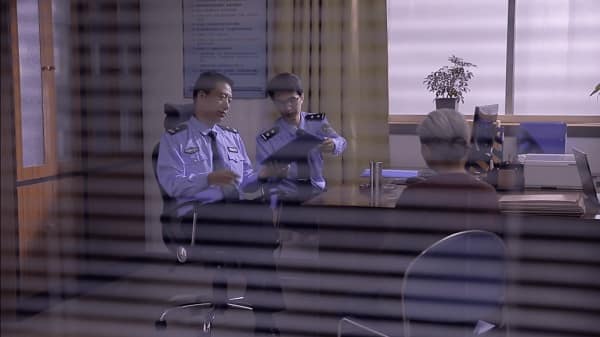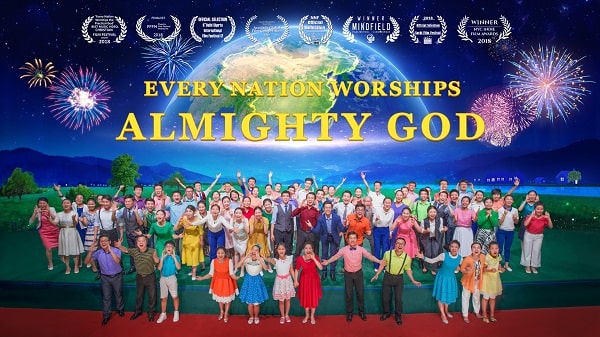Review: From the Jaws of Death—A Miraculous Experience of a 78-year-old Christian
The film From the Jaws of Death touches my heart when I only see its title, for the topic of life and death has been talked about throughout the ages. Then what kind of story does this film tell?
This film is a docudrama which is based on the real facts that the atheist Communist Party of China persecutes the religious belief and Christians, telling the true experience of a Chinese Christian who suffers persecution for her belief. In this film, the protagonist Liu Zhen, a 78-year-old Christian, endures the persecution and hindrance from both the CCP cops and her deceived family for her faith in God. Both physical and mental torment makes her path of believing in God especially difficult. At first, I thought that she may compromise under such powerful suppression, but to my surprise, she not only doesn’t compromise, but bravely faces the persecution of the CCP time and again. The words that she responds to the chief of the police station are wise and farsighted and forceful. Then how does she have such power and wisdom? An ordinary rural lady can remain so calm and undaunted while facing the persecution of the CCP cops, which really opens my eyes.
The film opens with a lively hymn, and then appears two people who are doing farm work. The hymn is sung by a gray-haired lady, and she is just the protagonist of the film. While seeing this, you may envy the joy of the old lady, and also feel curious about what makes her so happy. The director ingeniously reveals the answer to the audience through a family conversation in the next scene. It turns out that the protagonist is joyous not because of the fleshly blessings but the peace and joy in spirit bestowed by God.
Like many other people of the same age, Liu Zhen was riddled with diseases before she believed in God, and there was no smile on her face. But after she believed in God, not only is her illness cured, but she also becomes happy and open-minded and gains insight as well. Seeing her changes, her family all support her to believe in God, and Liu Zhen is immersed in happiness and joy. However, good times don’t last long. In this country ruled by the CCP, an atheistic party, there’s no freedom of belief at all, and whoever believes in God will be arrested and persecuted by the CCP government. This film is against the background of the CCP’s carrying out the large-scale nation-wide arrest against the Christians in 2012. Many Christians of Liu Zhen’s church are arrested by the cops. They suffer home searches and fining and some even suffer cruel tortures, and there’re also many who are sentenced or put into the labor camp. The CCP government even doesn’t let off Liu Zhen, a 78-year-old lady.
As Liu Zhen says when she is interrogated, “Why does the government of a great country make things difficult for an old lady?” Although she is old, she can see through these things. Believing in God is actually a good thing, and the Christians only gather together to read God’s words and pursue to cast off sins so as to live out the likeness of a true person. If there are more people believing in God, the country will become more stable, prosperous, and powerful. But why doesn’t the CCP government think the same way as those free, democratic countries do? In fact, it not only opposes the religious belief but even persecutes it, which is really incredible. It seems that there are some inside stories remaining to be revealed.
The words of Ma Biao, the chief of the police station, reveal some reasons for the CCP’s persecuting the religious belief. “The government has no choice but to restrict your belief in God. Just think! If all the Chinese people believe in God like you, who else will follow the CCP? Over whom will it exercise its power? … The CCP is an atheistic party, so it doesn’t allow people to believe in God, much less allow people to organize meetings secretly at home. This is the policy of the country.” The national government actually takes persecuting the religious belief as the state policy. It does not think about the important matters of the nation but focuses on how to persecute believers in God all day long. How evil it is! In order to make people abandon their belief, the CCP truly can think out all kinds of tricks. Seeing the scene when the policeman forcibly takes the fingerprint of Liu Zhen, I am very angry that the CCP actually charges people with crimes at will. From these plots, I must say that the director and scriptwriter have some knowledge of the darkness of the CCP or perhaps have experienced it personally; otherwise it’s impossible for them to dissect it so penetratingly.

The CCP government’s persecution of religious belief puts the old lady under suffocating pressure. Outwardly, she not only endures the interrogation and the threat of the CCP cops as well as the pressure from her family, who no longer support her belief in God but obstruct her out of fear, but she is also laughed by the unbelievers and monitored by the CCP’s informers. And the misery in her heart is even more killing: her daughter-in-law secretly hides her books of God’s word for fear of trouble; the hostile environment makes her unable to have meetings with other Christians; and she is even restricted in praying in her bedroom. All these pressures make the old lady feel worse than death. Unknowing what to do, she can only long for God in her heart.
In the midst of pain, Liu Zhen can’t help feeling puzzled: Since the CCP government is so hostile to God, why doesn’t God destroy it? Won’t the Christians be able to believe in God freely if there isn’t the persecution of the CCP? Then there comes one of the highlights of the film: Two Christians of the church wait for Liu Zhen on the way to the field at the risk of being arrested. Seeing the two sisters before her, Liu Zhen holds their hands with emotion and tears well up in her eyes, and then they three hug together. The plot plus the background music moves me a lot. It’s just through this brief gathering that Liu Zhen has her puzzlement resolved. She also comes to understand God’s thoughtful intention and has the determination and courage to pursue the truth with all her heart so as to break through the dark influence of the satanic CCP regime and stand testimony for God in persecution and tribulation.
Through reading and fellowshiping God’s words, Liu Zhen has her puzzlement resolved. However, the CCP never slackens its persecution of her; rather, it becomes fiercer than ever. The means that the CCP government uses to persecute the believers in God are so cruel that not only the Christians have the danger of being arrested at any time, but even their family are affected. Liu Zhen knows that the CCP won’t stop its persecution of her unless she gives up her belief in God. Such oppression makes her feel suffocated. And then winter comes; leaves on the cotton stalks all fall and there’re no crops available to hide them in the field. Liu Zhen loses contact with the church again; under the pressure of the CCP government, Liu Zhen’s family also supervise and restrict her more strictly. All of this makes Liu Zhen’s path of believing in God ever more difficult.
Since then, Liu Zhen lives in painful torment. Recalling the scenes when she had meetings and read God’s words with other Christians, she can’t help shedding tears silently; so many nights she can’t fall asleep but can only stand by the window, looking at the moon and crying to God in her heart. These plots touch my heart, making me feel that the persecution of the CCP government really does great harm to this old lady. She is not put into prison, but the torment she suffers is comparable to that of being imprisoned. Just as Liu Zhen questions the policeman, “I neither commit sins nor violate the laws in believing in God. But you interrogate, fine, and supervise me, and even go to my house to harass me. Your endless troubling has disturbed my life!” This expresses the heart’s voice of Liu Zhen and also exposes the facts of the CCP’s ruthlessly persecuting the Christians. Christians neither violate the law nor commit sins in believing in God, but the CCP just keeps troubling them. Isn’t this just driving them to the impasse? How can Liu Zhen extricate herself from such a plight? Perhaps only death can put all this to an end.
One night, Liu Zhen suddenly faints on the ground. After receiving medical treatment in the hospital, she’s still in a state of unconsciousness, and the doctor could do nothing about it. While watching this, I, on the one hand, grieve over her end: If not for the persecution of the CCP government, she could have spent her remaining years in happiness. On the other hand, I feel it’s regrettable that the film closes with such an ending.
However, the plot takes a favorable turn subsequently. After being unconscious for eighteen hours, Liu Zhen miraculously comes back to life, which, as the doctor says, is really a miracle. At this sight, I’m astounded. What makes me astounded is that this is a film adapted from a true story. That is to say, the protagonist’s being raised from death is an actual event, not merely a story told by the director. Perhaps, the precious point of the film is that, through the miraculous experience of the protagonist, it interprets some unchanging laws since time immemorial like “Human fate is ordained by Heaven,” “Man proposes, God disposes,” “Predestination,” and “Heaven’s will,” which not only overturns my former viewpoint on death, but also plays an active role and serves as the precious materials in guiding the whole society and the whole mankind to explore the mystery and true essence of life.
When I look back and savor the title of the film again after watching the movie, I feel enlightened and my admiration for the director arises spontaneously, for I finally grasp the profound implication of the title! On the one hand, it tells a true miracle of someone’s being raised from death; on the other hand, it tells about the life and death within the spirit. Along the hard journey of Liu Zhen’s believing in God, every time she suffers persecution is a test of life and death. If she abandons her belief for the sake of her physical life, then what she will face is the death of her spiritual life; if she would rather lose her physical life than give up her belief, then she will gain the eternal life God bestows. That is just the true meaning of what God says, “Whoever shall seek to save his life shall lose it; and whoever shall lose his life shall preserve it” (Luke 17:33).
Thank the protagonist for her relying on God bravely so that we can witness such a miraculous experience. It is indeed a heart-wrenching movie, but the happy ending makes us see the hope. I believe that it will also strengthen the faith of the Christians who are undergoing the persecution of the CCP government and give them the power.








